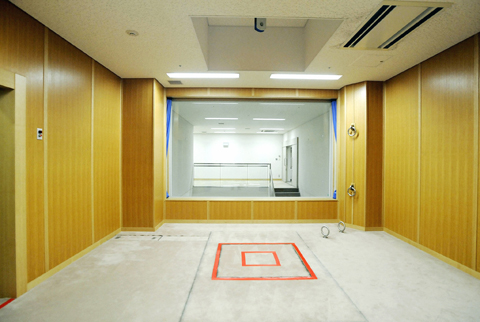Japan opened up its gallows for the first time to domestic media yesterday, a move that could spark public debate over executions in a country where a hefty majority supports retaining the death penalty.
The media tour at the Tokyo Detention Center — broadcast on major TV stations — appears to be driven by Japanese Justice Minister Keiko Chiba, who opposes the death penalty.
In July, Chiba approved — and witnessed — the hangings of two inmates convicted of murder, saying she was carrying out her duties as justice minister.

PHOTO: REUTERS/KYODO
Afterward, Chiba said she still supports abolishing capital punishment, and as a way to spur public debate, ordered that journalists be given a tour of the facilities, which Japanese press said was the first since at least the end of World War II. She also promised to create a ministry panel to discuss the death penalty, including whether it should be stopped.
TV footage from inside the Tokyo Detention Center showed the trap door, the viewing room and rooms where the inmate can meet with a cleric, with a Buddhist altar and a Buddha statue. The trap door was closed and the rope was not exhibited.
“There was the smell of incense ... The impression was that of sterile objects in a clean, carpeted room,” said a reporter from broadcaster NTV, among those taken to the prison in a bus, its windows obscured by curtains to hide the chamber’s location.
Footage also showed the “button room,” where three prison officers press a button at the same time to open the trap door, so that it is not clear which button opened the door.
Japan, along with the US, is one of only two G8 countries that retain capital punishment. It currently has 107 inmates on death row.
An overwhelming majority supports the death penalty in Japan. Last year, 86 percent said in a government survey that retaining the death penalty was unavoidable, up from 80 percent in 1999, though a recent NHK public TV survey put support at 57 percent.
Experts say they are concerned over how little the public knows about the death penalty despite a new lay judge system from last year under which ordinary citizens, along with judges, could hand down such sentences.
Japan has been criticized by the UN Committee against Torture and opponents of the death penalty over the secrecy of its execution system and the psychological strain it puts on inmates and their families.
“There will be no small impact from opening up the site of executions, until now shrouded in a thick veil,” Kyodo news agency said.
“It is fully possible that this will spark public debate over whether to maintain or abolish the system, as hoped for by the justice minister,” Kyodo said.
Inmates are notified on the morning of the execution, usually about an hour beforehand, and families of inmates are given no advance notification, experts say.
The Japanese Justice Ministry in 2007 started releasing the names and crimes of inmates sentenced to death.
Details on executions had previously been strictly limited and opponents of the death penalty say the ministry still restricts information.

Four people jailed in the landmark Hong Kong national security trial of "47 democrats" accused of conspiracy to commit subversion were freed today after more than four years behind bars, the second group to be released in a month. Among those freed was long-time political and LGBTQ activist Jimmy Sham (岑子杰), who also led one of Hong Kong’s largest pro-democracy groups, the Civil Human Rights Front, which disbanded in 2021. "Let me spend some time with my family," Sham said after arriving at his home in the Kowloon district of Jordan. "I don’t know how to plan ahead because, to me, it feels

Polish presidential candidates offered different visions of Poland and its relations with Ukraine in a televised debate ahead of next week’s run-off, which remains on a knife-edge. During a head-to-head debate lasting two hours, centrist Warsaw Mayor Rafal Trzaskowski, from Polish Prime Minister Donald Tusk’s governing pro-European coalition, faced the Eurosceptic historian Karol Nawrocki, backed by the right-wing populist Law and Justice party (PiS). The two candidates, who qualified for the second round after coming in the top two places in the first vote on Sunday last week, clashed over Poland’s relations with Ukraine, EU policy and the track records of their

‘A THREAT’: Guyanese President Irfan Ali called on Venezuela to follow international court rulings over the region, whose border Guyana says was ratified back in 1899 Misael Zapara said he would vote in Venezuela’s first elections yesterday for the territory of Essequibo, despite living more than 100km away from the oil-rich Guyana-administered region. Both countries lay claim to Essequibo, which makes up two-thirds of Guyana’s territory and is home to 125,000 of its 800,000 citizens. Guyana has administered the region for decades. The centuries-old dispute has intensified since ExxonMobil discovered massive offshore oil deposits a decade ago, giving Guyana the largest crude oil reserves per capita in the world. Venezuela would elect a governor, eight National Assembly deputies and regional councilors in a newly created constituency for the 160,000

North Korea has detained another official over last week’s failed launch of a warship, which damaged the naval destroyer, state media reported yesterday. Pyongyang announced “a serious accident” at Wednesday last week’s launch ceremony, which crushed sections of the bottom of the new destroyer. North Korean leader Kim Jong-un called the mishap a “criminal act caused by absolute carelessness.” Ri Hyong-son, vice department director of the Munitions Industry Department of the Party Central Committee, was summoned and detained on Sunday, the Korean Central News Agency (KCNA) reported. He was “greatly responsible for the occurrence of the serious accident,” it said. Ri is the fourth person